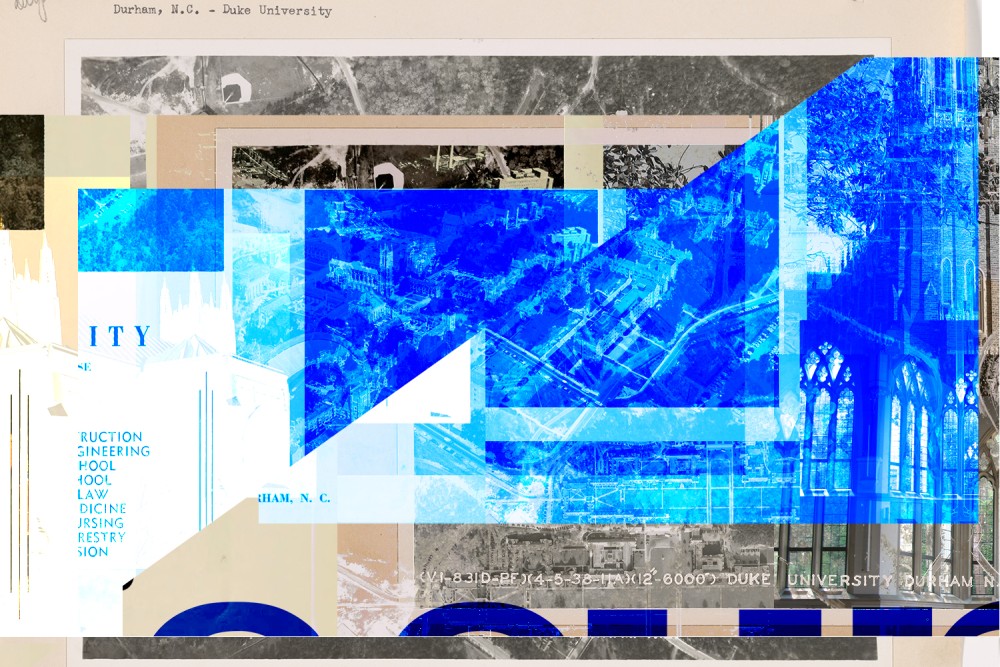A call to solidarity at Duke
At graduation, we faculty members looked at one another across the aisle, wondering which of us would be, in the university president’s words, “pruned and thinned.”

Century illustration (Source images: Creative Commons)
Every Mother’s Day for 26 years I have spent the weekend working. To be clear, I love teaching. I thank my students every semester for going through the hassle of applying to Duke Divinity School so I am paid to do what I love. Graduation weekend, which always coincides with Mother’s Day weekend, is celebratory and busy. It is also work. Duke University, the largest private employer in the region, expects many of its employees to spend our Mother’s Day working.
This Mother’s Day weekend was difficult, as faculty members labored under the gloom of layoffs. As we taught our last week of classes, the administration announced a round of “voluntary separations,” to be followed by layoffs, with the goal of cutting the budget by $350 million. In his address to what Duke branding calls the “community,” university president Vincent Price used this language to describe the process: “If we are smart and serious about pruning and perhaps thinning now as needed, we can position ourselves well for a vigorous response when conditions more conducive to growth return.”
Human beings working Mother’s Day weekend looked at one another across the aisles of our ceremonies, wondering who would be pruned and thinned for the sake of vigor. The day after Mother’s Day, people who have given countless hours to the endeavor of learning received stark emails with non-disclosure agreements.
Librarians, researchers, and key administrators at schools across the university are grieving. Those who have not yet been pruned are experiencing survivor’s guilt.
We are also organizing to call for a halt. A group of faculty, staff, and students called The Care Assembly has circulated a letter entitled “Duke Don’t Doge” to groups across the campus, including the new American Association of University Professors chapter, of which I am president. The Care Assembly’s summons is clear, calling for “a voluntary 25% pay cut from those earning over $1 million, and 10% from those earning between $500,000 and $1 million. A modest voluntary reduction from top earners alone could free up nearly $9.7 million.”
Some Duke faculty are concerned that the letter is quixotic and that endorsing it would make the AAUP chapter appear unrealistic, even silly. Here is another way to see it: In a cruel, nonsensical context, one response to the nonsense is to perform quixotically.
There is precedent for this. In 2010, the Durham Herald-Sun ran an article titled “Duke bonuses troubling in tough times” by independent researcher and Duke alumnus Ed Rickards. Rickards reported that “the new statistics on DUMAC [which handles Duke’s investments], Duke Corporate Education and Duke Health reveal how administrators have fostered a climate where their own salaries balloon.” He described the context as one in which “the burden of the fiscal crisis amounted to bonuses for the brass” and “a direct hit for cafeteria workers, groundskeepers, housekeepers, clerks and underpaid adjunct faculty who lost their jobs.”
Rickards called this situation a “profound moral issue.” He cited examples of Duke administrators’ pay: Anders Hall (base salary of $322,701 plus a $434,804 bonus), Andreas Ritter ($195,768 plus $269,500), Neal Triplett ($413,603 plus $729,749), and Victor Dzau ($979,435 plus $983,654).
My title is associate professor of Christian ethics. My specialty could be described as a sustained performance of nonsense. When this report appeared in 2010, former and current students, along with a few colleagues, joined me in planning a series of three street theater events to draw attention to the nonsensical context of giving big bonuses while also making cuts. We donned clever costumes and handed out fliers to inform people about the boondoggle. Surgeons, librarians, and Duke Gardens staff thanked us, but no one involved expected the performance to be particularly effective.
I helped to establish the AAUP chapter at Duke because I needed a union-like entity at my place of employment. The AAUP itself was formed in 1915, and the organization has countered the administrative prioritizing of efficiency over creativity and conscience ever since. The Care Assembly letter of 2025 is one creative way to refute a climate of fear and division. Whether or not the AAUP chapter votes to endorse the letter, I see the letter’s summons for what it is: a call to solidarity. As a Christian ethicist—whose job is in part to aver the absurdity of the resurrection of bodies and the presence of real blood at the Lord’s Supper—I can relate.
********************
Duke faculty member and author of this article Amy Laura Hall chats with the Century's Jon Mathieu about higher ed “pruning,” ethics, unions, and more.





